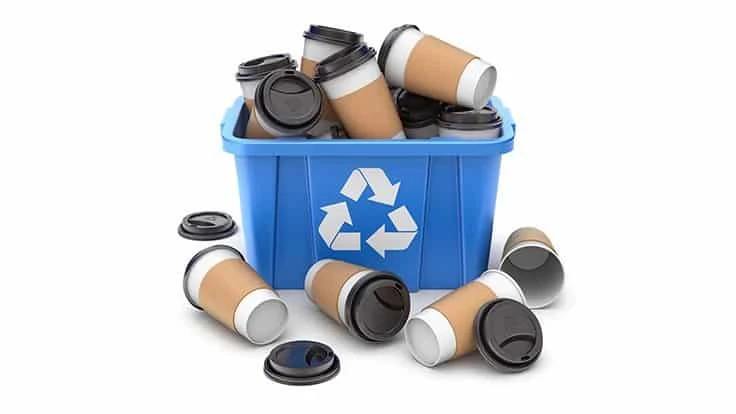
© mipan - stock.adobe.com
Georgia-Pacific, Atlanta, has announced that it is accepting mixed paper bales that contain single-use polyethylene- (PE-) coated paper cups at its recycled paper mills in Green Bay, Wisconsin, and Muskogee, Oklahoma.
According to a news release from Georgia-Pacific, this development follows two years of partnership with the Foodservice Packaging Institute (FPI), Falls Church, Virginia, and collaboration with the NextGen Consortium, a global initiative led by New York City-based Closed Loop Partners with founding partners Starbucks and McDonald’s, to help open opportunities for paper cup recycling.
“Georgia-Pacific is currently working with its mixed paper suppliers to encourage municipalities to accept PE-coated paper cups in their residential curbside collection in regions where end markets have been established,” says John Mulcahy, vice president of sustainability at Georgia-Pacific. “The company is also working closely with the Foodservice Packaging Institute (FPI) and its Paper Cup Alliance to inform Materials Recovery Facilities (MRFs) of this development. Georgia-Pacific is also now listed on FPI’s website as participating in PE-coated paper cup recovery efforts.”
Mulcahy adds that this new initiative won't change the amount of mixed paper Georgia-Pacific consumes, but he says it will allow MRFs to include PE-coated cups in the mixed paper bales that they supply to the Green Bay and Muskogee mills.
Georgia-Pacific says PE coatings, along with remaining liquid and food left behind from use, typically make it difficult to recover and recycle paper cups. The company says it has proven through repulping trials that its Green Bay and Muskogee mills can capture the fiber from paper cups while screening out the PE coatings. The cup fiber can be reused to make toilet tissue, napkins and paper towels.
“As single-use paper cups have grown in popularity in recent years so, too, has paper cup waste,” Mulcahy says. “As a leading manufacturer of paper foodservice products, we continually look for ways to consume fewer resources as part of our longer-term strategy to identify solutions that benefit society. Accepting mixed paper bales containing PE-coated cups at our Green Bay and Muskogee mills is a significant step in this direction.”
Over the past five years, Georgia-Pacific has invested more than $45 million in its pulping and recycled fiber processing equipment at its mills in Green Bay and Muskogee, Mulcahy says. "While these [investments] weren't specifically for recycling cups, the investments in new technology enables us to accept that valuable source of fiber."
Kate Daly, managing director of the Center for the Circular Economy at Closed Loop Partners, says Georgia-Pacific’s new repulping capability will benefit the foodservice industry and advance the industry’s environmental stewardship. “We are heartened to see Georgia-Pacific accelerate paper cup recycling through its acceptance of cups in mixed paper bales,” she says. “This acceptance will also benefit new nonpolyethylene next-generation cups, marking an important step forward for the industry as a whole, and we hope even more mills will follow this lead. Georgia-Pacific’s actions reinforce the value of the materials in paper cups and build critical markets for recycled materials. As the managing partner of the NextGen Consortium, we continue to work with leaders like Georgia-Pacific to engage, educate, and collaborate with stakeholders across the cup value chain in order to keep valuable materials in play.”
Beyond its current repulping efforts, Georgia-Pacific reports that it is also collaborating with the NextGen Consortium to trial at its mills next-generation paper cups that have replaced the PE-coating with materials that can be recycled or composted. As founding partners of the NextGen Consortium, McDonald’s and Starbucks say they are supportive of ongoing collaboration with Georgia-Pacific and encouraged by the company’s current repulping efforts.
“Increasing and improving the recyclability of cups is a vital part of our work within the NextGen Consortium. We are taking a meaningful step forward with Georgia-Pacific toward our goal of reducing paper cup waste. We’re excited by this progress and look forward to our continued partnership with organizations that support our vision of a resource-positive future,” says Michael Kobori, chief sustainability officer at Starbucks.
Marion Gross, chief supply chain officer, North America with McDonald’s, says, “Recovering, recycling and reusing the valuable materials in our cups is an important part of our sustainability ambition and our work with the NextGen Consortium. By accepting and reprocessing single-use cups, Georgia-Pacific is not only enhancing recycling pathways but also generating a supply pipeline of recycled content critical to positively impacting the environment and achieving our goals.”
Georgia-Pacific says it is working with FPI to expand and accelerate single-use PE-coated paper cup acceptance in curbside recycling programs in an effort to increase the number of households that can recycle paper cups.
Latest from Waste Today
- $9.8M in waste and recycling grants awarded in Nebraska
- Reworld, Goodwill Keystone honored with e-scrap recycling award
- Circular Services acquires Quantum Organics
- Lincoln Waste Solutions refreshes brand
- Spokane, Washington, explores carbon capture technology at WTE facility
- Rancho Las Virgenes Compost Facility—Calabasas, California
- Optimize wet waste management with Sebright Products High-Density Extruders
- Plum Creek announces new regional sales manager





